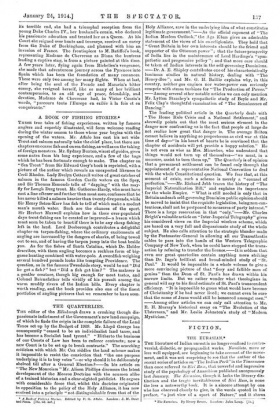THE QUARTERLIES.
THE editor of the Edinburgh draws a crashing though dis- passionate indictment of the Government's new land campaign, of which he finds the origin in the complete failure of the Land Taxes set up by the Budget of 1909. Mr. Lloyd George has consequently "ceased to be an individualist land taxer, and has become a Socialist land tyrant." "Hitherto the business of our Courts of Law has been to enforce contracts ; now a new Court is to be set up to break contracts." The searching criticism with which Mr. Cox riddles the land scheme makes it imposaible to resist the conviction that "the one purpose underlying it is to buy votes "—or why should it be deliberately shelved till after a General Election P—In his article on "The New Monroism "Mr. Alison Phillips discusses the latest development of the Monroe Doctrine with the acumen alike of a trained historian and a clear-sighted publicist. He argues with considerable force that, whilst this doctrine originated in opposition to the policy of the Holy Alliance, it has now evolved into a principle "not distinguishable from that of the • 4 Book of inaktng Stories. Edited by F. 0, Allot,. London; J. M. Dent 554 Sons. [31a. 6d. net.] Holy Alliance, save in the underlying idea of what constitutes legitimate government."—As the official exponent of "The Indian Moslem Outlook," the Aga Khan gives an admirable statement of the views of his co-religionists. They hold that "Great Britain in her own interests should be the friend and supporter of the Ottoman power"; that the future prosperity of India lies in the maintenance of Lord Hardinge's "sym- pathetic and progressive policy "; and that more care should be taken of Indian interests in the self-governing Dominions. —Dr. A. E. Shipley contributes one of his characteristically luminous studies in natural history, dealing with "The Honey-Bee "; and Mr. G. H. Baillie explains why, in this country, neither gas engines nor water-power can seriously compete with steam turbines for "The Production of Power." —Among several other notable articles we can only mention Mr. Lytton Strachey's sympathetic study of Beyle and Mr. Felix Clay's thoughtful examination of "The Renaissance of Dancing."
The leading political article in the Quarterly deals with "The Home Rule Crisis and a National Settlement," and shrewdly points out that the most serious element in the danger now confronting us is the fact that people at large do not realize how great that danger is. The average Briton cannot believe in anything so preposterous as civil war at this time of day—" in his heart of hearts be is convinced that the chapter of accidents will yet provide a happy solution." He is not even as wise as Mrs. Micawber, who understood that things would not tarn up of themselves—" we must, in a measure, assist to turn them up," The Quarterly is of opinion that a permanent settlement can be found only through the appointment of a representative National Convention to deal with the whole Constitutional question. We fear that, at this moment of crisis, such a scheme is merely a "counsel of perfection."—Mr. Richard Jebb traces the history of "The Imperial Naturalization Bill," and explains its importance for the whole Empire. "What is still needed is only that in Britain andeach self-governing Dominion public opinion should be moved to insist that the requisite legislation, beingnon.con. tentious, shall not be postponed to measures of party interest." There is a large reservation in that "only."—Mr. Charles Bright's valuable article on "Inter-Imperial Telegraphy" gives his considered views on the Imperial wireless scheme, which are based on a very full and dispassionate study of the whole subject He also calls attention to the strategic blunder made by the Postmaster-General in allowing all our Transatlantic cables to pass into the hands of the Western Telegraphic Company of New York, when he could have stopped the trans- action by refusing to transfer the licence.—It is seldom that even our great quarterlies contain anything more striking than Dr. Inge's brilliant and broad-minded study of "St. Paul." It would be impossible in a whole volume to give a more convincing picture of that "fiery and fallible man of genius" than the Dean of St. Paul's has drawn within his narrow limits. But we rather wonder what theologians in general will say to his final estimate of St. Paul's transcendent efficiency. "It is impossible to guess what would have become of Christianity if be had never lived ; we cannot even be sure that the name of Jesus would still be honoured amongst men." —Among other articles we can only call attention to Mr. It. H. Murray's historical essay on "The Evolution of the Ulsterman," and Mr. Leslie Johnston's study of "Modern Mysticism."






































 Previous page
Previous page